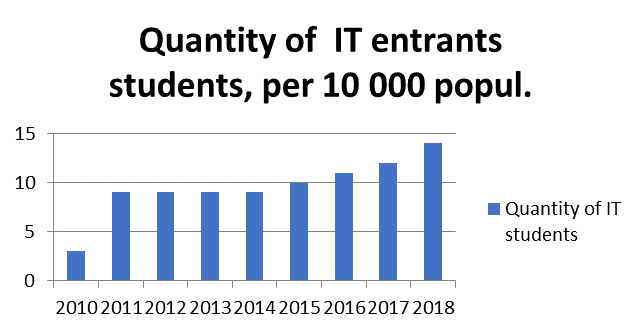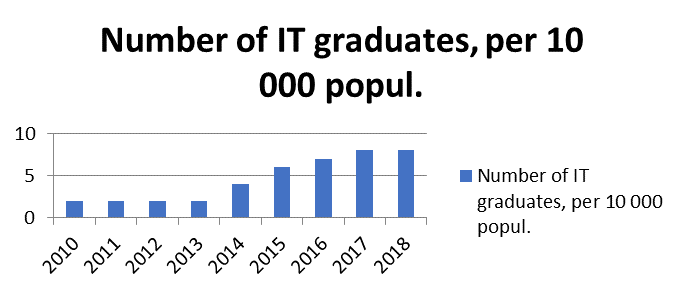Abstract
In modern conditions of digitalization of labor and technological processes, there is an objective need to restart the processes of state regulation of the changes. First of all, it concerns the issues of the digital economy staffing, where we can highlight many problems. Among them: a shortage of IT-specialists in the labor market, lack of necessary digital competencies, the presence of digital inequality among the population, caused by both age-related factors and regional aspects. The population of older ages cannot always learn the necessary digital competencies, and it concerns not only them, but also the youth in some regions. At the same time, the training volumes for IT professionals are still far from the requirements of the modern economy in the context of digitalization, and this also concerns the need to improve the quality of training, including its practical focus. It is also not clear what exactly digital competences should comprise in itself. Besides, the Russian economy requires specialists who can set tasks for IT workers, coordinate their work, and introduce digital offices. Another problem is the legal regulation of new forms of employment that have arisen under the influence of digitalization, ensuring equal working and payment conditions and for all categories of workers, as precarization of distance employment has been observed recently. The research proves that it is impossible to solve above mentioned problems without government involvement and outlines the ways to solve them.
Keywords: Digital economystaff shortagesdigital inequalitythe formation of digital competencies
Introduction
The functioning of the labour sphere in Russia is currently under the influence of different factors, the most significant of which is the digitalization of the economy. Today, under its influence, the transformation of the structure of the employed is noted, the nature and the labour content, as well as social and labour relations are changing ( Schmidt, Samrailova, Veshkurova, Shapiro, & Filimonova, 2018). As practice analysis shows, various forms of remote employment are successfully developing in the Russian economy: remote work, freelance, crowdsourcing. This allows to increase the level of employment, makes it possible for employees to manage their working time and reduce the cost of manufacturing products and providing services to employers.
Problem Statement
At the same time, despite of the positive trends mentioned above, as well as the reduction of time for communication between organizations and within them, we should mention a number of problems that have been identified recently in the connection with the transition to a digital economy. Among them, the most important one is the staffing of the digital economy, which is negatively affected by: digital inequality among the population, lack of necessary digital competencies among employees and graduates, inconsistency of training volumes for workers in the field of information technology, which leads to their shortage in the labor market.
Research Questions
A special place among these problems is occupied by the digital inequality that has recently arisen in Russia, which consists in the fact that people and organizations that do not have the necessary digital competencies are not competitive in modern conditions, even if their potential is high in other respects ( Kuznetsov, 2019). At the same time, with regard to labor, the age and regional aspects should be noted. For example, not in all regions there are opportunities for the formation and development of digital competencies among people of different age categories ( Fondevila Gascón, Carreras Alcalde, Seebach, & Pesqueira Zamora, 2015). The situation is much more complicated with older people who do not have digital competencies of the required level ( Nimrod, 2018) as well as a shortage of specialists in the IT sphere, which significantly limits the state’s plans in the digital economy.
Purpose of the Study
The purpose of this study is to analyse the staffing of the digitalization of the Russian economy at the present stage: to identify positive aspects and highlight the problem points. Identify tools to overcome existing shortcomings and the main vectors of the formation and development of personnel for the digital economy. To study the role of the state in these issues.
Research Methods
For these purposes, we will use the following methods: a critical analysis of scientific and methodological literature and empirical methods. The study is also based on the elements of comparative, structural and system analysis, methods of analogy and synthesis. To obtain the required conclusions, expert assessment methods were applied.
Findings
In 2017 the national program “Digital Economy” in Russia was adopted and approved .The implementation of this program is impossible without adequate staffing ( Ciriaci, Moncada-Paternò-Castello, & Voigt, 2016). Currently, there is a shortage of IT specialists in the Russian labor market, which is estimated at about one million people annually. The graduation of these specialists, despite the fact that for 2010-2017 significantly increased, still lags behind the requirements of the modern Russian economy (Fig


In this regard, the Passport of the federal project ( Ministry of Economic Development of Russia, 2019) identified indicators of staffing for the implementation of this project. Among them were indicated such as: “the number of graduates of a higher education with key competencies for the digital economy”, “accepted to universities in specialties in the field of information technology”, the proportion of the population with digital skills in the digital economy”, and others. For example, the proportion of the population with digital skills by 2024 should be at least 40%. But the content of digital competencies it is not entirely clear. It was supposed that this will be done by authorities in the spring-summer period of 2019, but there is still no data. And it affects the staffing, because you definitely need to know what to teach. However, many professional standards already specify the necessary digital competencies for work. ( Doljenkova, Polevaya, & Rudenko, 2019). The development of the digital economy implies not only the presence of IT-specialists, but also those who are able to correctly set the task, develop technical specifications and understand how to implement digital services. There is no doubt that such specialists should be trained in the system of professional education ( Hrnjic, 2016) but it is obvious that universities alone cannot solve such a problem. Here, representatives of IT companies that actively participate in the learning process should play their role ( Kergroach, 2017) providing their software products, opening laboratories and basic departments, as well as attracting students to participate in joint projects, internships and practices. It seems that the formation of digital competencies in the population should begin as early as school age, developing training programs and services. At the same time, programs both in schools and in the vocational training system should be radically revised in the direction of relevance and practical orientation ( Parkes, Stein, & Reading, 2015).
Conclusion
To overcome the existing shortage of personnel for the digital economy, it is necessary to increase the reference numbers for admission to specialties in the field of information technology. In accordance with the Passport for staffing, to develop a system of vocational training and services for the formation of digital competencies. Particular attention should be paid to the legal regulation of distance employment ( Dolzhenkova & Sidorkina, 2015) as well as the development of measures to reduce the digital divide. This category of workers is not covered by the Federal Law “On a special assessment of working conditions”. Social and labor relations are being transformed between them and employers, which may be tripartite, hybrid, and are not always within the legal framework. It is necessary to develop measures for the legislative regulation of these problems. The state needs more accurate planning of the benchmarks for training specialists in the field of information technology in order to eliminate the deficit of this category of workers in the labor market.
References
- Ciriaci, D., Moncada-Paternò-Castello, P., & Voigt, P. (2016). Innovation and job creation: A sustainable relation? Eurasian Business Review, 6(2), 189-213. https://doi.org/ 10.1007/s40821-015-0031-3
- Doljenkova, Yu. V., Polevaya, M. V., & Rudenko, G. G. (2019). The new system of remuneration of labor in budget health care: Analysis of practice and problems of implementation. Problems of Social Hygiene, Healthcare and the History of Medicine, 27(4), 452-458. [in Rus.].
- Dolzhenkova, Yu. V., & Sidorkina, S. V. (2015). Distance employment in Russia: Current state and outlook. Bulletin of NSUEU, 1, 156-161. [in Rus.].
- Federal Service State Statistics (2019). Monitoring the development of the information society in the Russian Federation. Retrieved from: https://www.gks.ru/search?q=мониторинг+развития+информационного+общества+в+россииAccessed: 10.10.2019. [in Rus.].
- Fondevila Gascón, J. F., Carreras Alcalde, M., Seebach, S., & Pesqueira Zamora, M. J. (2015). How elders evaluate apps: A contribution to the study of smartphones and to the analysis of the usefulness and accessibility of ICTS for older adults. Mobile Media and Communication, 3(2), 250-266. https://doi.org/10.1177/2050157914560185
- Hrnjic, A. (2016). The transformation of higher education: Evaluation of CRM concept application and its impact on student satisfaction. Eurasian Business Review, 6(1), 53-77. https://doi.org/10.1007/s40821-015-0037-x
- Kergroach, S. (2017). Industry 4.0: New challenges and opportunities for the labor market. Foresight and STI Governance 11(4), 6-8.
- Kuznetsov, N. V. (2019). State program "Digital Economy of the Russian Federation": Analysis of the preparedness of the regions. Regional Economics and Management: Electronic Scientific Journal, 1(57), 5709. Retrieved from: https://eee-region.ru/article/5709/ Accessed: 10.10.2019. [in Rus.].
- Ministry of Economic Development of Russia (2019). "Personnel for the Digital Economy" the passport of the national program "Digital Economy" Retrieved from: https://digital.gov.ru/ru/activity/directions/866/ Accessed: 10.10.2019. [in Rus.].
- Nimrod, G. (2018). Technophobia among older Internet users. Educational Gerontology, 44(2-3), 148-162. https://doi.org/10.1080/03601277.2018.1428145
- Parkes, M., Stein, S., & Reading, C. (2015). Student preparedness for university e-learning environments. The Internet and Higher Education, 25, 1-10. https://doi.org/10.1016/j.iheduc.2014.10.002
- Schmidt, O. S., Samrailova, O. K., Veshkurova, A. B., Shapiro, S. A., & Filimonova, I. V. (2018). Features of the labor market crises: Social consequences. International Journal of Mechanical Engineering and Technology (IJMET), 9(12), 83-90.
Copyright information

This work is licensed under a Creative Commons Attribution-NonCommercial-NoDerivatives 4.0 International License.
About this article
Publication Date
09 March 2020
Article Doi
eBook ISBN
978-1-80296-078-5
Publisher
European Publisher
Volume
79
Print ISBN (optional)
-
Edition Number
1st Edition
Pages
1-1576
Subjects
Business, business ethics, social responsibility, innovation, ethical issues, scientific developments, technological developments
Cite this article as:
Dolzhenkova*, Y. V., & Filimonova, I. V. (2020). Stuffing Features In A Digital Economy In Russia: Problems And Solutions. In S. I. Ashmarina, & V. V. Mantulenko (Eds.), Global Challenges and Prospects of the Modern Economic Development, vol 79. European Proceedings of Social and Behavioural Sciences (pp. 1066-1070). European Publisher. https://doi.org/10.15405/epsbs.2020.03.153
